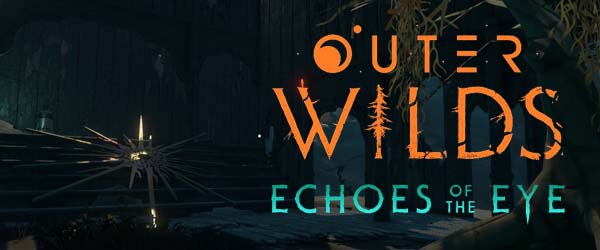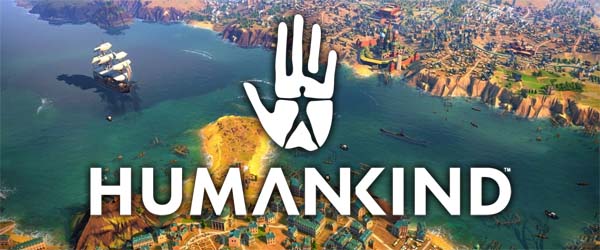
When I played it last year (after waiting over a year for its timed Epic Store exclusivity to end), Outer Wilds quickly became one of my favorite games ever due to its innovative sci-fi, exploratory gameplay in its dynamic sandbox solar system full of interesting places that are genuinely worth exploring. It was a compelling sci-fi game about the nature of science and the desire to find out place in the universe. It was also a compelling player-driven mystery game that doesn't hold the player's hand and which provides genuine "eureka!" moments.
I wasn't expecting an expansion because the game seemed so perfect and self-contained that I struggled to even think of what could be included in an expansion. Would they add more planets to the solar system? Would it be a stand-alone prequel with the player playing as one of the extinct Nomai?
But I sure as hell was not going to pass up an excuse to revisit Timber Hearth!
I wasn't going to pass up an excuse to revisit Timber Hearth!
River rafting around the world
One of my favorite things about Outer Wilds is its open-ended exploration of the hand-crafted solar system. Each world is a little puzzle box for the player to unlock, with the solutions to every puzzle involving some sci-fi physics concept that the player has to learn and apply.
The puzzles of Echoes of the Eye don't seem to have that same sci-fi quality to them. Most puzzles involve the use of light, and feel like they could be puzzles in any earthbound adventure or fantasy setting. I just point flashlights at things to trigger mechanisms, turn lights off or on to trigger secret passageways, or turn off my source of light to sneak past photo-sensitive sentries in the dark. I guess I should praise the puzzle design for never falling back on the tried-and-true (yet rote) method of reflecting light off mirrors or through prisms. The actual puzzles are a bit more clever than this, but I just don't find it to be a very engaging or interesting gimmick, especially compared to how novel and creative the core Outer Wilds puzzle box is.
The use of light as the instrument for most interactions with Echoes of the Eye seems to be the result of a concerted effort by the developers to use base game mechanics that are under-utilized in the base game, such as the flashlight and ability to nap at bonfires. The puzzles just lack that sense of awe and discovery that comes with progressing in the base game.
Echoes of the Eye starts off strong with solving a space-based mystery.
Some of the late puzzles do start to embrace Outer Wilds's sci-fi nature. They hide some very fun and interesting surprises that really mess with the player's perception of reality in a very video-game-meta sort of way. But they are so esoteric that the game almost has to literally tell the player what to do. It's like "summoning the tornado in Simon's Quest" levels of esoteric at times.
Honestly, I think the single best puzzle in the game is the one that the player has to solve just to get access to the DLC! It's also the most "Outer Wilds" feeling puzzle in the game. The developers managed to cleverly hide the DLC in plain sight, as if it had been there all along.
The opening for the DLC tasks the player with finding a remote satellite and solving a simple puzzle involving it. Then the expansion treats the player with the awe-inspiring discovery of a massive hidden world that makes up the expansion's primary setting. After that, however, everything feels like pretty typical adventure game stuff. Instead of planet-hopping in a tiny space capsule, I find myself white-water rafting and watching home movies on slide projectors. Later on, there's some horror-adjacent exploration of dark spaces with just a flashlight, and even a little bit of hide-and-seek. Again, it's nothing I haven't seen in a hundred other indie games.
[More]
15313440-eb6a-44bf-a4ea-2d4d369d1f4e|0|.0
Tags:Outer Wilds, Echoes of the Eye, Steam, PC, Epic Game Store, science fiction, mystery, exploration, open world, Eye of the Universe, solar system, space, ring world
There are days in all of our lives in which our life irreversibly changes forever. A few weeks ago, I had such a day. My partner of 7 years and I welcomed into the world a new baby boy. Little Julian was born via C-section in early September at 7 pounds and 3 ounces, and is so far healthy and happy.
My partner and I welcomed our baby son, Julian into the world in early September.
Regular readers might know that I already have a child for all intents and purposes. When I met my partner, she already had a 3 year old daughter from a previous relationship. We've had full custody of that child, and so I've been raising as my own. Since I didn't even meet her until she was 3 years old, I missed out on all the baby stuff. In fact, she was just finishing up potty training when I met her, so I never had to deal with diapers. I had a daughter, but I never had a baby.
The only time I've ever had to deal with infants and diapers and bottles was years ago when a co-worker and friend friend had twin daughters through (I think) in vitro fertilization. She was raising the girls as a single mother and needed some extra help, and since she lived a few minutes from me, I offered to go over and help watch the babies from time to time so that she could take care of chores around the house. She taught me how to change diapers, feed babies, hold them, and calm them when they were crying. One of the twins was particularly responsive to me, and always seemed to calm down when I held her.
They were my little "practice babies", and I was sad when their mother decided to move out of state to the midwest to be with family. She had limited support here (even with friends and colleagues like me trying to help out whenever we could), so I can't blame or fault her for the decision.
But now I have a little baby of my own, and so that practice is finally paying off!
With my partner bed-ridden after the C-section, I was responsible for diaper changes in the first couple days.
In fact, I had to put that practice into effect almost immediately. Since my partner had to have a C-section, she was bed-ridden for the first couple days after the delivery. This meant that during those first couple days in the hospital, I was on full-time diaper duty. Newborn diapers weren't exactly what I was prepared for. The thick, black, sticky meconium was quite a bit different than what I remembered from the practice twins. Having a boy also meant I had the risk of being peed on during a diaper change, which isn't really a problem with baby girls (as far as I've been told). Though Julian has actually yet to pee on us directly. He did pee on his own face once though. I was holding is legs up to clean him after a dirty diaper, he started peeing while pointing right at his face. He was not a happy baby. [More]
2ea2afcb-f187-4c8f-9e97-53fabe253b4e|4|3.8
Tags:newborn, baby, child, parenthood, fatherhood, pregnancy, hospital, COVID-19, pandemic, diaper, meconium, C-section

It's really weird to feel good about a team that is 0-6 on the season, but that is kind of how I feel about this 2021 UNLV football team. Their latest loss is a 4th quarter collapse against Utah State by a score of 28-24. UNLV seemed in control throughout almost the entire game until the 4th quarter. The offense was moving the ball with Charles Williams putting up over 200 yards rushing, and backup QB Cameron Friel was looking good -- up until about midway through the third quarter, when Utah State's defense tightened up, started keying entirely on the run, and UNLV couldn't move the ball. In the meantime, Utah State pivoted their offense more towards the run, and even though UNLV's defense had been stout against the run earlier in the game, they suddenly started giving up big plays on the ground.
I thought for sure that a Utah State comeback would be through the air. UNLV's zone defense had huge gaps between the linebackers and safeties, and Utah State's receivers were finding those soft spots all throughout the first half. UNLV either needed to soften their zone coverages, and let Utah State have the underneath throws, or they needed to switch to more man coverage. But I didn't really get to see whether either of those adjustments would make a difference, since Utah State focused so heavily on the run in the second half.
 Photo credit: Steve Marcus, Las Vegas Sun.
Photo credit: Steve Marcus, Las Vegas Sun.
UNLV had stuffed the run the entire first half, but Utah State powered through to win in the 4th.
This is the fourth game this season that UNLV has lost by one score, and the fifth game in which they've covered the point spread. Two of those games were against ranked opponents. Despite not having won a single game yet this year, this UNLV team is not getting blown out in the way that they have in years' past. I'm used to seeing scores like 45-20, in which the game is over by the start of the 4th quarter. This year though, UNLV has had a chance to win the game right up to the final drive. Despite the winless record, this feels like an improvement.
This leaves me in the confusing and frustrating position of wondering whether this 0-6 UNLV team is actually "good" -- or at least better than their 0-6 record would indicate. [More]

Even though I write frequently about the NFL and the Chicago Bears, I have (believe it or not) never been to a regular season NFL game. Living in Las Vegas, seeing an NFL game always required a road trip. My dad and I went to a few preseason games in Pheonix and San Diego when I was younger (I once saw Joe Montana play the first quarter of a preseason game with the Chiefs), but my dad is a public school teacher, the start of the NFL regular season always coincides with the start of the school year, and so road trips were impractical. So we had never been to a regular season game.
Until now.
I was public and outspoken about my misgivings regarding the financing of the Raiders' stadium in Las Vegas, and I vowed not to support the team. The Raiders were already getting unnecessary corporate welfare from the city of Las Vegas, so I wasn't going to be subsidizing them further with money from my pockets if proceeds from ticket sales weren't going back to the city of Las Vegas. In my opinion, a publicly-financed stadium should put proceeds from ticket sales into the city coffers, and I don't approve of any publicly-funded stadium that doesn't. Mark Davis is a multi-millionaire, and the Raiders are a multi-billion dollar entity; Davis and the Raiders should be able to pay to build their own damn stadium without handouts from taxpayers.
The situation with funding the stadium changed since, and I've softened my position on supporting the team and seeing events at the stadium. One exception that I always had was that I would be willing to shell out for a game if / when the Bears come to town. So I check the schedule when it's released in the spring to see if there's a home game against the Bears.
Sure enough, this year, there was a Bears game on the schedule, and it just happened to be on my birthday, no less!
I saw my first regular season NFL game. The Bears came to Vegas to play the Raiders on my birthday.
The Raiders have a mandatory vaccination policy for attendees, but I still masked-up as an added precaution. [More]

It's going to be virtually impossible to review Humankind without frequently comparing it to iterations of Sid Meier's Civilization. Civ has absolutely dominated (and almost completely monopolized) the historical turn-based strategy genre. There have been plenty of space and sci-fi-themed 4x strategy games, ranging from Master of Orion, to Galactic Civilizations, to Stellaris, and even Amplitude's own Endless Space; but not a whole lot in the more Earth-bound sub-genre. I've also been a huge Civ fan (as the readers of my blog can no doubt tell), so it's hard for me to look at any game in this genre and not partially judge it through the lense of comparing it to Civ.
So I'm not even going to pretend to judge Humankind strictly on its own merits, in a vacuum. I simply can't. I'm not sure if anyone can. Amplitude, as a company, clearly looked to Civ for inspiration, took lessons from the successes and failures of its previous strategy games, and said "hey, we want a piece of that pie too." But despite the surface-level comparisons to Civ, Amplitude takes a very different approach to game design. While Civ has always been very firmly rooted as a "digital board game", Humankind takes a much more story-driven and "simulationist" approach, akin to the sort of thing that you might see in a game like Crusader Kings. I think this approach works, and it does a good job of separating Humankind from Civilization.
Culture wars
Perhaps the biggest deviation that Humankind makes from Sid Meier's Civilization is the way that it handles the game's civilizations themselves. In Humankind, you don't play as a single civilization throughout an entire campaign. Instead, each era you have the opportunity to select a new culture from a list of era-specific cultures. I like this concept a lot in principle, but also have some misgivings about the way it works out in practice.
Empires transition into a new culture at the start of each era.
On the one hand, it's great to see a game like this recognize the fact that civilizations aren't singular, monolithic cultures that exist forever, unless they are conquered or die off completely. That gaming paradigm (which Civ has always embraced) ignores the reality that cultures change and evolve over time. They change with the times, and blend elements from other neighboring cultures. And even if a nation or empire falls or collapses, it doesn't just disappear off the face of the planet overnight. It's people get absorbed into whatever nation or empire replaces it, and those people continue to influence the development of that new culture.
But this isn't exactly how Humankind works. The cultures of the game don't gradually transition or evolve due to social, economic, political, or geographic pressures and influences. Instead, at arbitrary points throughout the game, each empire completely changes its culture in a single game turn. And you aren't locked into choosing a related or similar culture either. You can pick any culture that is still available from the given era, no matter how separated that new culture might be from your old culture -- whether that be geographic separation, ideological separation, or even racial separation. I can be Greek one turn, and then suddenly be Aztec the next, and be Khmer the following era.
I was hoping for a system in which players would have to select from a list of related cultures when transitioning into a new era. For example, I was imagining that being Classical Romans means that, when the medieval era hits, I would have to chose between a related culture like Byzantine, Holy Roman, Ostrogothic, Franks, or Papal States. Then, depending on which I picked, my culture would continue to shift to another related culture in the following era. For example, if I picked Byzantine as my medieval successor to Rome, then my early modern culture choices would be things along the lines of the Ottomans or Orthodox Rus; whereas, if I had gone with the Papal States or Holy Roman Empire, then my choices would be things like Venetian, German, or French.
Changing cultures each era is no more silly than ancient
Abraham Lincoln leading ancient America in a bear-skin hat.
Instead, these transitions from one culture to another over the span of a single turn can be very jarring in Humankind. But I guess it's no less jarring than seeing an ancient era Abraham Lincoln leading America in 4000 B.C.E. while wearing his silly bearskin tophat.
I hope that if Humankind gets expansions, that those expansions will modify this culture-changing mechanic so that there are more cultures available each era, but your choices are limited to cultures that are related to the one you were playing in the previous era. Maybe it costs influence (or maybe even fame) to change cultures, and changing to an un-related culture costs more than changing to a closely related one. I know it can be difficult to find such examples of related offshoots for every possible culture, especially for cultures that were conquered or died off in real life, but I think it's a solvable problem.
It's easy to come up with possible successors to the Roman Empire, because every culture in Europe and Asia Minor seemed to claim succession from Rome. It's a lot harder to come up with related successors to culture like the Aztecs or Maya, and it would seem insensitive or outright offensive to limit the choice of succession to the colonial European cultures that had conquered or massacred them in real history. But there are options. In the case of the Maya or Aztecs, successor options could include cultures like the various Pueblo or Navajo cultures, but I admit that's kind of a stretch.
[More]
a4a8da10-6ef4-4c31-ace5-83a2acd8f305|0|.0
Tags:Humankind, Amplitude Studios, strategy, grand strategy, history, steam, PC, Sid Meier's Civilization, neolithic, outpost, colony
|

| 12 | | | | | | | 60 | | 11 | | | | | | | 55 | | 10 | | | | | | | 50 | | 09 | | | | | | | 45 | | 08 | | | | | | | 40 | | 07 | | | | | | | 35 | | 06 | | | | | | | 30 | | 05 | | | | | | | 25 | | 04 | | | | | | | 20 | | 03 | | | | | | | 15 | | 02 | | | | | | | 10 | | 01 | | | | | | | 05 |
|